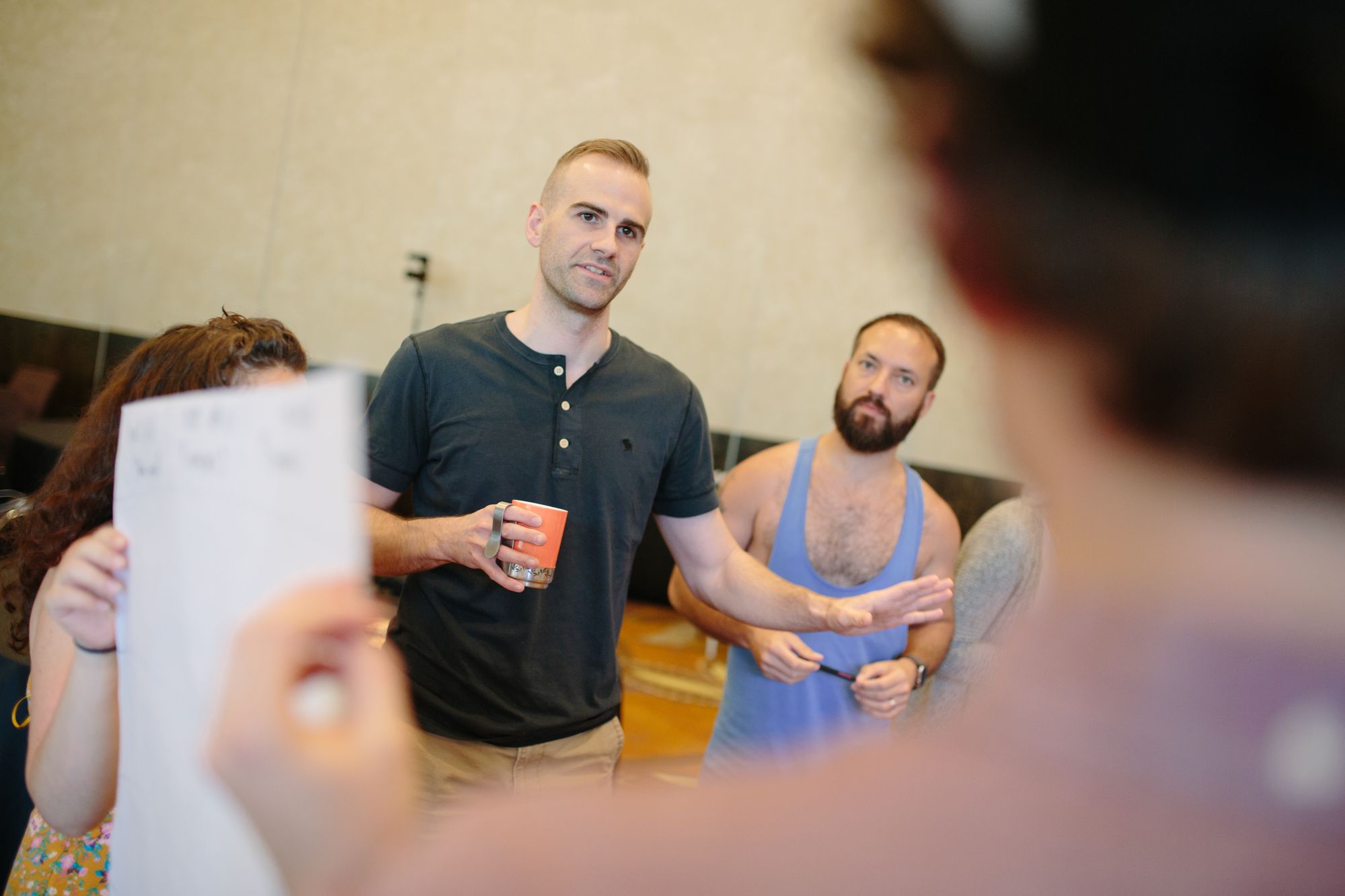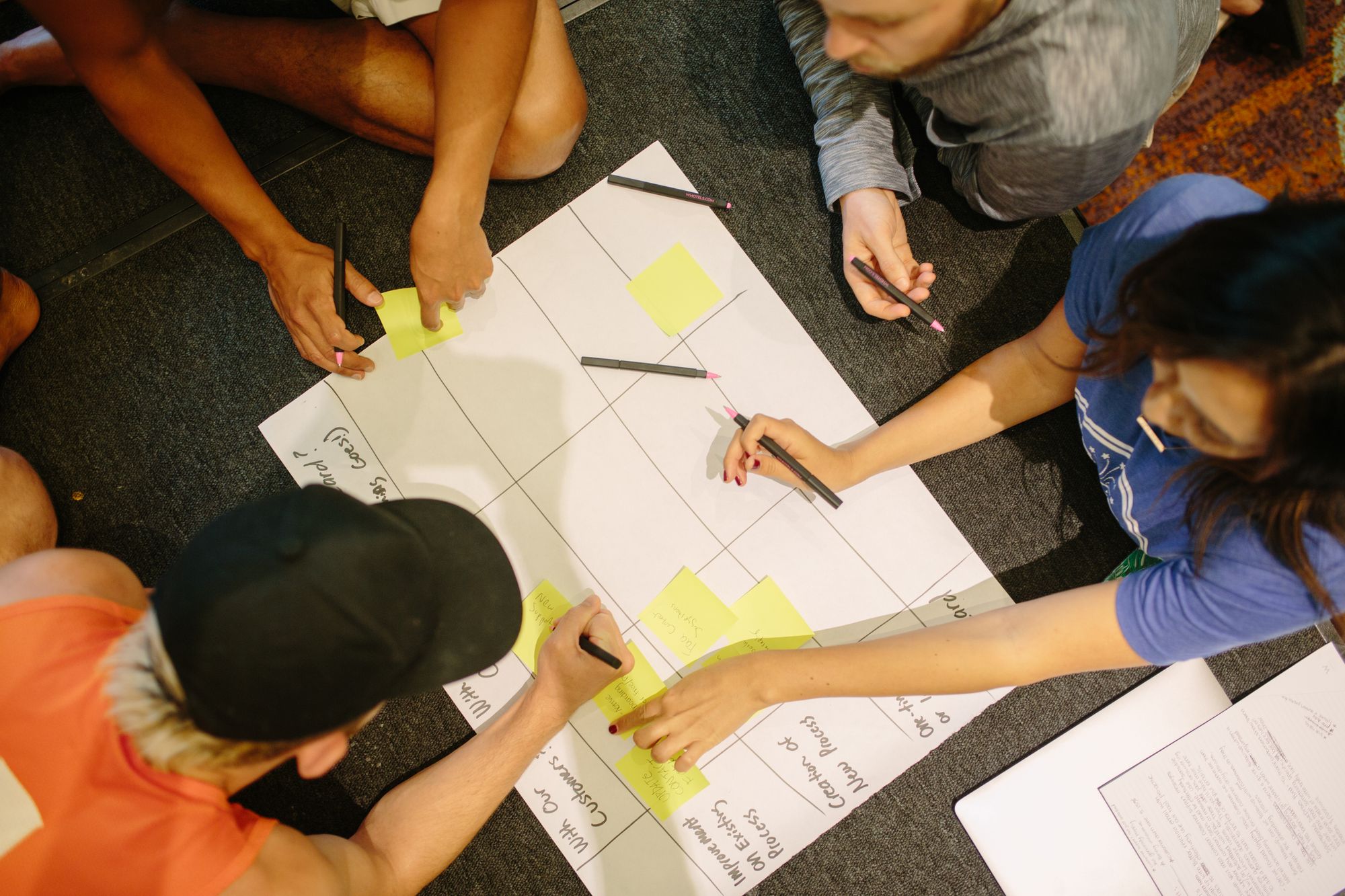Workplace of the future - Page 4

Communication is the most important tool we have when it comes to team work – especially in remote work . But as an engineer, in the past I’ve focused more on code than communication. Although I talked to people, my output was writing code and solving problems. So when I became a manager , I realized that I needed to listen a lot more. Learning to Listen Listening sounds so simple, right? Well, for me it

It’s hard to believe that the Buffer team has been on 10 team retreats already, in locations all around the world. I was lucky enough to start at Buffer in 2012, back before our first retreat, so I’ve attended all 10! These gatherings have taken many different shapes since our first back in 2013 , where a handful of us went to Lake Tahoe. Up until 2016, we had retreats twice a year. But our team grew so large over time that it made a lot more sense to

Learning about the experiences and history of LGBTQ+ people shouldn’t stop after June, which is why we wanted to share an updated list of resources to help us all learn how to be the best allies we can be! First, a brief history of Pride Although Pride might seem like a month of parades and glitter these days, its origins are far from celebratory. The first Pride rally occurred a month after the Stonewall riots in 1969. A well-known gay bar, Stonewall was a safe space for drag queens
At Buffer we regularly hold what we call ‘Snackchats’. These are short & informal presentations of something that we want to share with our team which help to build on our engineering culture and help each other to grow as engineers. Anyone on the team has the opportunity to give these talks Once a discussion has been proposed, a day / time can be picked ready for people to grab a drink (and snack!) to take some time out of their day to learn something new. These have been happening at Buffer

Anxious to make a good impression on my first day at Buffer, I asked my role buddy: “What’s the best way to start the day? Should I ping someone when I’m online?” “Feel free to start the day at your leisure,” Nicole said. Mind. Blown. I already knew Buffer was an amazing company. I wasn’t shocked that I could make my own schedule. But for the first time, I wasn’t just reading about and admiring the culture from afar. I was actually experiencing it for myself. It’s a level of trust I’ve never

There’s been a lot of crying in my career – tears of frustration, sadness, and also joy. As a newspaper editor, reporters would sometimes come into my office, close the door and break down in sobs. Doing social media for an open-office tech startup, I had to leave the building and walk around the block to cry. No job has normalized tears for me more than Buffer, and I’m so grateful for it. At Buffer, we try to bring ourselves authentically to work. We delight in the joys of life – new babi

Within any company, the organizational chart lives a complicated, contradictory experience. At times, the org chart represents beloved clarity and organization. Other times, it represents rigidity and the tyranny of top-down, hierarchical systems. Organizations often phase out their org charts only to resurrect them again when they find themselves looking for an answer on organization and structure. While some may come back in original form, many companies are looking for new and improved ways

Imagine no longer being able to enjoy time with friends and family, because work is constantly on your mind and your phone is constantly in your hand – and the more you stress, the worse you feel. Or imagine the job you once loved suddenly feeling hollow and pointless, leaving you depressed and constantly fatigued. For a lot of us who feel deeply connected to our work, this is almost unthinkable. But these are some classic signs of burnout, which can lead to serious physical, mental, and s

In mid-2017, I hit burnout in a really big way and wound up taking a 6-week break to recharge. I want to fully share my story here and include some things I wish I’d done differently in the hope that this can help anyone else experiencing burnout. How it began: A year of change, stress, and loss Looking back, the lead-up to my burnout goes back to the end of 2015. My co-founder and I were growing apart on our vision for Buffer’s future, which continued throughout 2016 despite several in-perso

There was a time where I wholly embraced calling our team — our company — a family. I’ve written cards to our community members and called them part of our Buffer family. I’ve sent custom packages to welcome our new teammates to the Buffer family (and we’ve grown from 25 teammates to nearly 90 in about four years.) I relished how the term “family” made everyone feel so welcomed, accepted, and appreciated. There’s nothi

The concept of a career path at Buffer has changed a lot over the past seven years. We’ve gone through various phases as an organization: beginning as an early-stage startup where everyone did a bit of everything, then to a period when we decided against having managers and leaned into a flat structure , and now to a lean level of management
At Buffer we regularly hold what we call ‘Snackchats’. These are short & informal presentations of something that we want to share with our team which help to build on our engineering culture and help each other to grow as engineers. Anyone on the team has the opportunity to give these talks ? Once a discussion has been proposed, a day/time can be picked ready for people to grab a drink (and snack!) to take some time out of their day to learn something new. These have been happening at Buffer f

Experimentation and iteration lie at the heart of a lot of things we do at Buffer. If you’ve been following the Open Blog for some time, or even if you’ve just popped by (hey there!), you might notice that we reflect on remote work–a lot . Our remote setup enables our distributed team to work wherever they’re happiest and that freedom is a much-valued perk that Buffer teammates enjoy. Our employees feel trusted to be in control of their job, and for us, we

Here at Buffer, we believe that what gets measured, gets managed. That’s important because with effective management and oversight, we have the tools and knowledge to effectively make change happen. But how do you measure an emotion? Certainly, you may notice the signs of an emotion like happiness trending up or down. When it’s trending downward, you’ll notice that productivity wanes, morale decreases, and people leave for other jobs. And when it’s tre

Growing pains. Every company gets them, and the pains come in all sorts of ways, from the tactical (tools ) to the philosophical (this post). As your company grows, some of your team members may feel like they have less impact. You may find it harder to set accountabilities and goals. Things can start to feel “top down.” We find ourselves dreaming about being empowered, making our own decisions, and setting our own goals. Wouldn’t it be nice to ma

When you experiment with work culture as much as we do at Buffer, you tend to receive a lot of questions about it. What is it like to work remotely? How do you collaborate across time zones? Do people really feel okay making their salaries public? Can you become friends with teammates when you’re not in an office? Do you miss working in an office? Do you basically live in pajamas? (Quick answer to that one: not usually, though I definitely have spent a work day or two in pajamas!) These qu

Almost two years ago, I fell into becoming a manager . In my past career, I never thought that this would happen. Most of my life I’ve been a maker: working as an engineer, solving technical problems and building apps, products, or just circuit boards. People management was a huge change. I learned a lot of things the hard way through trial and error, success and failure — but also by reading a lot [https://buffer.com/resources/how-to-read-more-a

Having managers isn’t something we do at Buffer just because it’s what other companies usually do. We’ve always been proud to be different and to follow the path less travelled — even when it comes to people management. Over the past few years, we’ve tried it all: from experimenting with full self-management (no managers) to having leads and managers supporting our team [https://bu

With transparency in business on the rise, more and more businesses have been talking openly about their hiring, their diversity and inclusion efforts, and even their revenue. Transparency is more than just a PR or marketing ploy for a business. There are significant advantages to productivity, trust, culture, and morale when you embrace transparency. We are fortunate to have been learning about transparency for the past seven years at Buffer — lots of lessons, good and bad, that we’re ex

Can you tell when you’re talking to someone from Buffer ? Absent any Twitter handle or an email “From” name or other identifying element, if you were essentially Internet-blindfolded, could you distinguish between a conversation with one brand versus another? If so, what a powerful impact that brand must have! We’d love to cultivate this type of unified voice and style at Buffer. As part of that journey, we created a company-wide content style guide as a resource on communi

Diversity and inclusion is one of the most important areas for us as we grow our company. We’d love to help others embrace it as well. In addition to all the benefits we’ve seen — innovation, product quality, unique perspectives, team morale, success — we believe in diversity and inclusion because it is the right thing to do and is the type of future we want to build toward. This article contains a lot more detail on the subject as well as specific strategies and tactics that you can imple

As a globally distributed team , one of the most interesting things to experiment with is how we collaborate and innovate when we’re all spread out. A couple weeks ago, we tried out that stalwart of engineering innovation – the hackathon! In researching hackathons, it was clear we needed to rethink a lot of the traditional structure … particularly this: As a remote team, we couldn’t all be in a room together, ordering in food and grouping around a laptop.

Imagine a world without Slack .. Weeping, mourning, and gnashing of teeth, right? Slack is a ubiquitous part of so many workplaces. The real-time messaging and communication app has become the go-to for so many remote workplaces , distributed teams, and offices. Buffer , included. It’s also been a point of contention in our always-on, always-connected “alerts” culture. Are we too reliant on Slack? Many [https

Buffer is a fully remote team . It’s a decision I made at the end of 2012, when Buffer was in its infancy, and it’s interesting to reflect on that decision now. I am happy to report that I am in love with the choice we made to be distributed all across the world. When I say that we’re a remote, distributed team, I mean that we’re literally spread across the whole world. Buffer is a team of 79 right now , and we have teammates on a